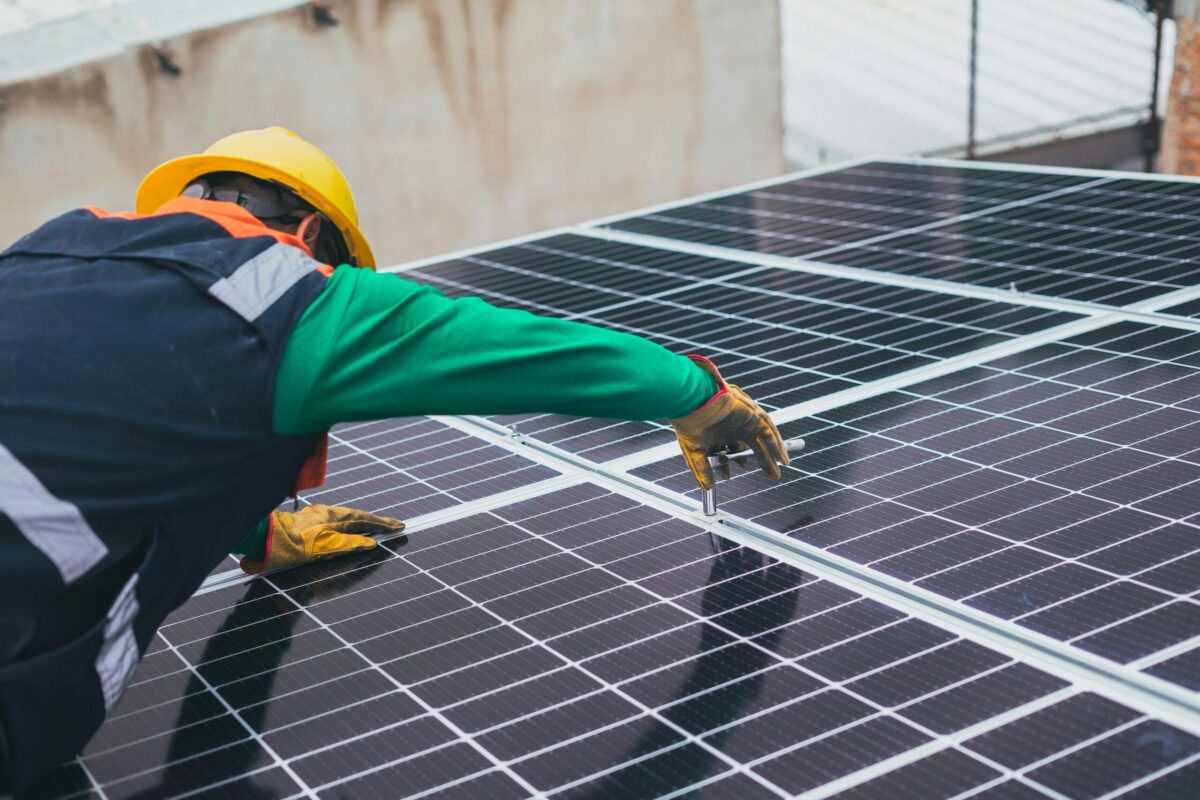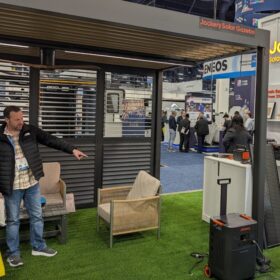In another move that is a boon to large investor-owned utilities in California and a bane to market competition, a distributed solar and storage microgrid proposed by Sunnova was advised to be rejected.
The Public Advisor’s Office (PAO) suggested that California Public Utilities Commission (CPUC) deny solar and storage provider Sunnova from providing microgrid services in the state. The decision comes on the heels of the passage of NEM 3.0, which signals a deeper regulatory moat-digging around the centralized utility business model.
“Our application clearly outlines the reliability, rate, environmental, and other public interest benefits that community microgrids can provide. This proposed decision is troubling and disappointing for a state that has set such bold climate targets yet is struggling with making steady progress on them,” said Meghan Nutting, executive vice president of government and regulatory affairs.
Sunnova proposed the “micro utility” service in September 2022, seeking to equip new construction homes with solar and storage and aggregate them in a microgrid. Distributed energy aggregation is a proven more efficient way to supply resilient renewable energy than the centralized utility model. Read more about the wide set of promising benefits of aggregation here.
“It is curious and concerning that the PAO, a presumably independent division of the CPUC who is charged with representing the public interest, is seeking to dismiss our microgrid application before it gets any opportunity to be heard through a public hearing,” said Nutting.
The PAO proposed decision to deny can be found here. CPUC retains the authority to approve or deny the application regardless of PAO’s suggestion.
As stated on its website, the PAO is designed to represent the public interest, shielding it from unfair practices by utilities. “The office’s mission is to advocate for the lowest possible monthly bills for customers of California’s regulated utilities consistent with safety, reliability, and the state’s environmental goals. As the only State entity charged with this responsibility, the PAO represents utility customer interests before the CPUC,” said the PAO site.
Despite this, Sunnova argues that the PAO’s proposed decision to deny flies in direct contrast to its stated mission. The company said its project provides market-based rates, no diminishment in safety, consumer choice about how they obtain and use energy, greater reliability, and meaningful advancement toward the state’s environmental goals.
In its 2021 to 2022 transmission plan, the California Independent System Operator (CAISO) announced 23 transmission projects at an estimated cost of $2.9 billion. These costs are pushed to homeowners in the form of electricity rate increases. A significant portion of these costs could be avoided if California instead pivoted to a decentralized model of energy.
“We see a future where communities, neighborhoods, and businesses can operate independently from the legacy grid with sustainable energy sources that provide uninterrupted power. We believe microgrids address a strong need in the market for more robust energy solutions and better connectivity. The Sunnova Adaptive Community will provide consumers with the ability to produce, share, and deliver power when it’s needed most,” said William J Berger, founder and CEO of Sunnova.
This content is protected by copyright and may not be reused. If you want to cooperate with us and would like to reuse some of our content, please contact: editors@pv-magazine.com.









Kowtowing to their IOU overlords, has PAO no shame? Apparently, they fear no consequences for their actions. Their customers will be outraged as their higher costs come to roost on them.
This is sad, very sad, so god-awful much more needs to be done on the Carbon front, and now our National leading solar State, and its citizens are being shackled and pilloried for doing the right thing. A disgusting and damaging precedent!
In Florida, we just dodged a NEM bullet when our Governor gratefully, fortunately, and rightly vetoed a covert political ploy by FP&L to gut NEM in Florida. Public exposure and transparency is critical for public pushback. Effective Citizens Utility Boards (CUB) are essential to watch what happens under the table at PUCs.
Wow, what a corrupt collection of creeps the CPUC is. . . . . “…the PAO, a presumably independent division of the CPUC who is charged with representing the public interest…”. What a sick joke! I hope Sunnova has the ability to sue the pants off the CPUC and make them pay reparations one way or another.
Why is this surprising to anyone? I mean really? This shows once again how empty the people are in there heads from crap promises.
Keep voting for your stupid overlords based on stupid promises and this is what exaclty what you get.
Hey, I promise all of you 1 billion dollars
Now vote me in cause I will make your interests my concern.
What a brain-dead decision. Distributed systems ARE the future and here is yet another state organization trying to fight the inevitable.
What a sad day for California.
The PAO & CPUC are full of corrupt individuals. They care not about anyone but themselves.
Is the public utility required to contract for and supply power to the micro grid on demand? If so then the micro grid operators are total frauds. If they are not connected to the grid with any switches than go for it. The vast majority of the public have no clue how the grid and its participants work, both operationally and financially. After 30 years in utilities I avoid discussions with lay people.
Vote republican. The problem is thus idea is too proactively responsible for individual well planned communities. It does not equitably distribute the suck that is CA’s power strategy. Think socialist, not personal responsibility. You might not share your good energy when everyone else gets cut off. Therefore you also might not support their tax initiatives to fund their pockets and large scale energy projects that don’t work during inclimate weather, and times of emergency.
This just sounds like rich communities will build their own power plants and grids and then they won’t get your money to subsidize all the people that don’t work so get free energy.
So I looked into the proposed decision by the PAO and it looks like Sunnova filed to become a “energy services provided” i.e. an electric utility was woefully incomplete with no engineering drawings, diagrams and everything was only conceptual in nature without any buisness and factual calculations.
I would not approve a company to provide me electricity if their only words were along the lines of “TRUST ME BRO!”
CPUC & PAO are a scam! PAO helping Big utility keep their monopolies. It’s disgusting we have to deal with this 💩! The CPUC should be dismantled and big utility should be state owned. Private corporations more concerned about shareholders and profits than what is best for the tax paying citizens of California.
Interestingly at Humboldt Cal Poly there was a big discussion yesterday with leaders in the solar industry about this topic. Everyone agreed distributed systems are the future!
While I don’t disagree microgrids are a great opportunity… did anyone bother to even open the proposed decision? The applicant left out multiple things required in a CPCN application and that’s one of the clear reasons for rejection. The CPUC isn’t going to consider any company’s or utility’s applicaiton if it’s missing a bunch of required information.
When you go deadpan you go dark.
Given the track record of corruption and public abuse with impunity, I would be shocked if the application was approved. Everyone knows that California’s “green agenda” is a sham – unless it means levying more taxes and having greater control. This is what happens when you have an autocrat in the governor’s office and a legislature that only takes top-down orders from party officials. By the way, mind your food scaps lest be hit with a $1,000 fine – all in the name of curbing global warming.
After reading the proposed decision, I actually agree with the PAO on this (noting that other intervenors, including The Utility Reform Network, identify the same infirmities in the application). The good news is that, if Sunnova wishes, it can refile a new application that addresses the issues identified in the proposed order. However, the CPUC cannot simply disregard statutory directives respecting oversight of electrical corporations and approval of rates. The regulatory structure in California is quite different from that in Texas (Sunnova’s home state).
The reason for this is that the califorina utilities commission is bought off by PG&E, If the public knew what pg&e employees made they would be up in arms, that union is robbing the people of califorina
Humans are too greedy and stupid (in that order, actually) to get out of their own way. They will deserve everything that is headed their way in the future.
If there ever was a more valid argument for distributed generation than Russias targeting Ukraine’s central Station Utility model I don’t know what it would be. Russia would run out of ammunition before taking down thousands of micro grids across a country like ours, or even Ukraine.